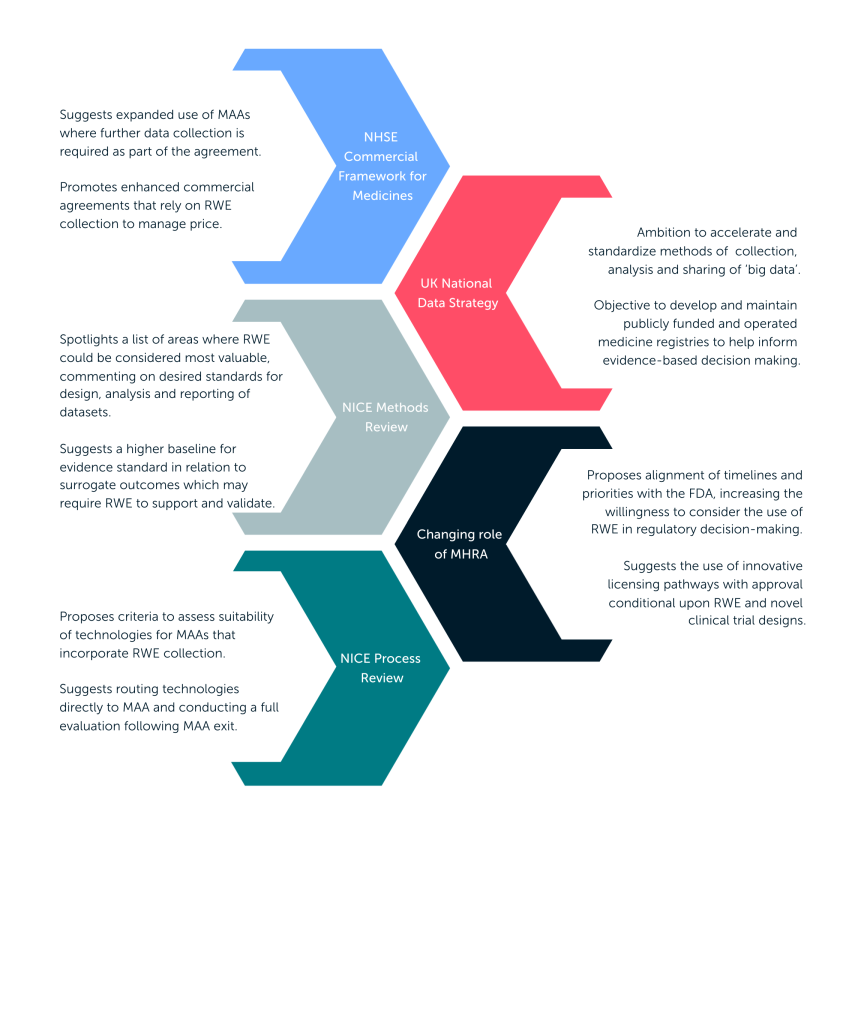Authored by BresMed, now part of Lumanity
Drug development is changing, and guidance around the evaluation and approval of new treatments must change with it. The drive to develop medicines for conditions with the most severe unmet need – often rare and with no established or effective standard of care – frequently requires manufacturers to launch technologies based on evidence characterized by non-randomized trial designs with small sample sizes and limited follow-up. Of course, such evidence leads to regulatory and payer decision makers facing a high level of uncertainty when assessing the magnitude of the novel technology’s relative treatment benefit. If we are to accelerate access to transformative therapies, then we must acknowledge that greater flexibility in assessment and payment models is needed to address this uncertainty.
Globally, regulators, HTA bodies and payers are grappling with how to accelerate access in a manner that still protects the safety of patients and ensures value for the wider health system. Authorities in different jurisdictions are likely to approach these challenges in different ways. Some, such as the AIFA in Italy, have long since advocated pragmatic approaches to using data collected post-launch to manage uncertainty.¹ Similarly, in France, such mechanisms have been in place since 1994 via the Authorisation Temporaire d’Utilisation (ATU) system, by which the use of treatments in severe diseases with high medical need is permitted ahead of acquiring marketing authorization.
In England, there are several ongoing initiatives that aim to address the parallel need to change the way data are used and introduce additional flexibility into the processes for regulation and approval. Here, we highlight the efforts being made in England to build the foundations for overcoming this problem.
Ongoing policy initiatives in England: connecting the dots
Throughout 2021, decision makers across regulatory (MHRA), HTA (NICE) and payer (NHSE) organizations in England will conclude several process evaluations and make various recommendations on how to better manage increasing levels of evidence uncertainty when evaluating the use of new health technologies. A common thread running through all these initiatives is the opportunity for expanding the use of real world evidence to manage uncertainty, both in making discrete recommendations on a particular appraisal and in the regular monitoring of outcomes measured in treatment practice. The Commercial Framework for Medicines has been developed to set out NHSE’s approach to commercial activity for new branded medicines in England. In reviewing its methods and processes of technology appraisal, NICE aims to consult with stakeholders on how to ensure that decision-making frameworks for evaluation remain cutting-edge and future-proof in the changing landscape of drug development. The MHRA has, in a post-Brexit world, emerged as the UK’s standalone medicines and medical devices regulator, and it is currently adjusting to this role and its overall responsibility for ensuring speed and efficiency in how new medicines are assessed in an effort to preserve the UK’s importance as a launch market. The UK National Data Strategy is a government initiative that seeks to harness the power of data to boost productivity, create new businesses and jobs, improve public services and position the UK as the forerunner of the next wave of innovation.
All of these processes, as shown on the following page, are underpinned by a desire to incorporate real world evidence more formally within decision-making frameworks in order to mitigate this uncertainty.
Although these different initiatives are not explicitly linked, there is a clear common ambition to spotlight the role real world data can have in reducing uncertainty and minimizing its consequences. It has been suggested that, with the right infrastructure and supportive policy, England could move to a system of conditional approval with regular re-evaluation. As far back as 2012, the prospect of ‘adaptive licensing’ has been proposed as a flexible means of providing conditional approvals through iterative phases of evidence gathering and evaluation.² Eicher et al. suggested that for many treatments in the future, this ‘lifespan’ approach – conditional approval and constant re-evaluation using real world evidence to moderate the price – will be the only viable access route.
Policy evaluations in England show an increased desire to expand the use of real world data in regulatory and HTA decision making.

There are promising signs that decision makers in England may be beginning to introduce the policy foundations for more flexible approaches through advocating system-level improvements in how data are collected, shared and ultimately used in technology evaluations. NICE have in the recent past partnered with Flatiron Health, a US-based healthcare technology and services company, to conduct research exploring the increased use of real world data in HTA decision making.³ Coupled with the desire to develop new ‘national medicines registries’ outlined in a recent government white paper⁴, it certainly suggests a pivot towards increased use of these kinds of evidence.
In this ambition, they are not alone. Each of the five largest European markets only approved Yescarta®; and Kymriah® conditionally or temporarily, conditional upon the collection of real world evidence to inform the estimates of ongoing effectiveness and ultimately price. These are outcomes-based agreements that rely on real world evidence, with the option for reassessment of clinical benefit at a future date.⁵ More recently, we see a reimbursement framework established for the gene therapy Zolgensma®, with reimbursement conditional upon subsequent data collection by US payers⁶; a similar agreement has been made with NHSE.⁷ Such initiatives, while increasingly common across markets, face the same set of issues: i) the challenges of obtaining robust estimates of relative treatment benefit from registry-based data; ii) the need to control costs while enabling access to therapies with the potential to transform otherwise severe patient outcomes; iii) differing data collection priorities between regulators and payers; and iv) the need to minimize the burden of data collection imposed on the healthcare system.
Evidence uncertainty is a globally relevant problem. There is a desire for faster access to transformative medicines answering to increasingly specific medical needs, whilst manufacturers seek to maximize the time between initiation of sales and loss of exclusivity. Across a number of markets, not least England, the policy context and enabling infrastructure are shifting to reduce the decision uncertainty innate to rapidly
accessing transformative therapies – but there is no ‘silver bullet’. If assessments are to shift from being static to dynamic, there will be a need for constant interface between payers, regulators and the clinical community to ensure consistency in decision making, and a critical need to raise the bar for both the collection and analysis of real world data.
For manufacturers, strategy planning must incorporate the need to expand the use of ‘value demonstration’ beyond its current remit if they are to meet the convergent needs of regulatory and HTA agencies. This means not only anticipating the use of real world evidence earlier in the drug development process, but also preparing for an ongoing need to demonstrate value post-approval.
For payers, the purpose of these initiatives is to use regular re-evaluation as a means of managing evidence uncertainty while ensuring patients gain early access to innovative therapies. Whilst the benefits of early access to treatment are immediately realized, the cost or negative impacts for patients may only become clear in the more distant future. For those making prescribing decisions, a programme of reevaluation could lead to reduced access in the longer-term following a period of interim availability, which may consequently affect a patients’ planned treatment pathway. Although difficult to elicit, the value of future ‘promising’ treatment options is paramount to a patient’s quality of life, and the movement to a more dynamic approval market risks adding anxiety and emotional distress.
Contact us to learn how our research scientists and data luminaries can help you identify fit-for-purpose real world data and design studies to generate the strongest evidence to meet stakeholder needs and navigate the increasingly complex path to market.
References
- Ferrario A and Kanavos P. Managed entry agreements for pharmaceuticals: the European experience. 2013. Available at: http://eprints.lse.ac.uk/50513/. Accessed: 09 April 2021.
- Eichler HG, Oye K, Baird LG, et al. Adaptive licensing: taking the next step in the evolution of drug approval. Clin Pharmacol Ther. 2012; 91(3):426-37.
- Flatiron Health. NICE Partners with Flatiron Health to Develop Real-World Evidence Research Methodologies. 2020. Available at: https://www.england.nhs.uk/2021/03/nhs-england-strikes-deal-on-life-saving-gene-therapy-drug-that-can-help-babies-with-rare-genetic-disease-move-and-walk/https://flatiron.com/press/press-release/nice-partnership-2020/. Accessed: 09 April 2021.
- Department of Health & Social Care UK. Policy paper. Integration and innovation: working together to improve health and social care for all. (Updated: 11 February 2021) Available at: https://www.gov.uk/government/publications/working-together-to-improve-health-and-social-care-forall/integration-and-innovation-working-together-to-improve-health-and-social-care-for-all-htmlversion. Accessed: 09 April 2021.
- Jørgensen J, Hanna E and Kefalas P. Outcomes-based reimbursement for gene therapies in practice: the experience of recently launched CAR-T cell therapies in major European countries. J Mark Access Health Policy. 2020; 8(1):1715536.
- Novartis. Zolgensma® data including patients with more severe SMA at baseline further demonstrate therapeutic benefit, including prolonged event-free survival, increased motor function and milestone achievement. 2020. Available at: https://www.novartis.com/news/media-releases/zolgensma-dataincluding-patients-more-severe-sma-baseline-further-demonstrate-therapeutic-benefit-includingprolonged-event-free-survival-increased-motor. Accessed: 09 April 2021.
- NHS England. NHS England strikes deal on life-saving gene-therapy drug that can help babies with rare genetic disease move and walk. 2021. Available at: https://www.england.nhs.uk/2021/03/nhs-englandstrikes-deal-on-life-saving-gene-therapy-drug-that-can-help-babies-with-rare-genetic-disease-moveand-walk/. Accessed: 09 April 2021.












